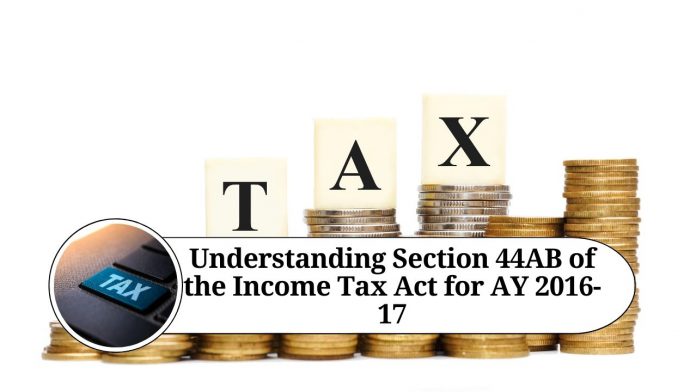Section 44AB of the Income Tax Act, 1961, mandates that certain categories of taxpayers must get their accounts audited by a chartered accountant before filing their tax returns. This provision applies to businesses, professionals, and other taxpayers whose gross receipts or total sales, turnover, or gross receipts exceed certain prescribed limits.
For the assessment year (AY) 2016-17, the prescribed limit for businesses was Rs. 1 crore, while for professionals, it was Rs. 25 lakhs. These limits are periodically revised by the government.
If a taxpayer is covered under the provisions of Section 44AB, they must obtain an audit report in Form 3CA/3CB, as the case may be, along with the auditor’s certificate in Form 3CD. These forms contain details of various aspects of the taxpayer’s business, such as turnover, expenses, investments, loans, and compliance with tax laws.
The audit report and certificate must be filed along with the taxpayer’s income tax return. Failure to comply with the provisions of Section 44AB can result in penalties and prosecution under the Income Tax Act.
It is essential to note that the audit under Section 44AB is distinct from other types of audits, such as a statutory audit or a tax audit conducted by the tax authorities. The purpose of the Section 44AB audit is to ensure that the taxpayer’s books of accounts are in order and that they have complied with various provisions of the Income Tax Act.
Who is covered under Section 44AB?
Section 44AB applies to the following categories of taxpayers:
- Businesses: Any person carrying on a business whose total sales, turnover, or gross receipts exceed Rs. 1 crore in the previous year.
- Professionals: Any person carrying on a profession whose gross receipts exceed Rs. 25 lakhs in the previous year.
- Other taxpayers: Any person who is required to get their accounts audited under any other provisions of the Income Tax Act.
What is the purpose of the audit under Section 44AB?
The audit under Section 44AB is intended to achieve the following objectives:
- To ensure the accuracy of the taxpayer’s books of accounts, including their financial statements, balance sheet, and profit and loss account.
- To verify that the taxpayer has complied with various provisions of the Income Tax Act, including deductions, exemptions, and tax liability.
- To detect any instances of tax evasion or non-compliance with tax laws.
What are the consequences of non-compliance with Section 44AB?
Failure to comply with the provisions of Section 44AB can result in the following consequences:
- Penalty: If the taxpayer fails to get their accounts audited and file the necessary audit reports and certificates, they may be liable to pay a penalty of 0.5% of their turnover or gross receipts, subject to a maximum of Rs. 1,50,000.
- Prosecution: In case of willful non-compliance or falsification of accounts, the taxpayer may be liable to face prosecution under the Income Tax Act.
- Ineligibility for certain deductions: If the taxpayer fails to get their accounts audited and file the necessary audit reports and certificates, they may be ineligible for certain deductions under the Income Tax Act.
In conclusion
Section 44AB is an important provision of the Income Tax Act that applies to businesses, professionals, and other taxpayers whose gross receipts or total sales exceed certain prescribed limits. It is crucial to comply with the provisions of Section 44AB and obtain the necessary audit reports and certificates to avoid penalties and other consequences.
Read more useful content:
- section 145 of income tax act
- section 10e of income tax act
- section 9 of the income tax act
- section 94b of income tax act
- section 206aa of income tax act
Frequently Asked Questions (FAQs)
Q: Who is required to get their accounts audited under Section 44AB?
A: Businesses and professionals whose gross receipts or total sales exceed certain prescribed limits, as well as other taxpayers who are required to get their accounts audited under any other provisions of the Income Tax Act.
Q: What is the prescribed limit for businesses and professionals under Section 44AB for AY 2016-17?
A: For businesses, the prescribed limit was Rs. 1 crore, while for professionals, it was Rs. 25 lakhs.
Q: What is the purpose of the audit under Section 44AB?
A: The audit under Section 44AB is intended to ensure the accuracy of the taxpayer’s books of accounts, verify their compliance with various provisions of the Income Tax Act, and detect instances of tax evasion or non-compliance with tax laws.
Q: What is the penalty for non-compliance with Section 44AB?
A: If the taxpayer fails to get their accounts audited and file the necessary audit reports and certificates, they may be liable to pay a penalty of 0.5% of their turnover or gross receipts, subject to a maximum of Rs. 1,50,000.
Q: What is the form for the audit report and certificate under Section 44AB?
A: The audit report is to be submitted in Form 3CA/3CB, as the case may be, and the auditor’s certificate is to be submitted in Form 3CD.
Q: Is the audit under Section 44AB the same as a statutory audit or a tax audit conducted by the tax authorities?
A: No, the audit under Section 44AB is distinct from other types of audits and is conducted by a chartered accountant appointed by the taxpayer.
Q: Is there any benefit to getting accounts audited even if not required under Section 44AB?
A: Yes, getting accounts audited can help improve the accuracy and reliability of financial statements, and also demonstrate the taxpayer’s compliance with tax laws. It can also help in obtaining loans and other financial benefits.
Q: Can a taxpayer opt out of getting their accounts audited under Section 44AB?
A: No, if a taxpayer falls under the prescribed limits and their accounts are required to be audited under Section 44AB, they cannot opt out of the audit.




















